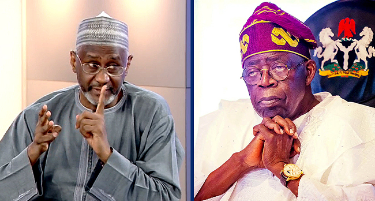A political commentator and member of the Northern Elders Forum (NEF), Prof. Usman Yusuf, has criticized President Bola Tinubu’s administration, claiming that it has exacerbated the hopelessness among Nigerians over the past year.
Yusuf, who previously served as the Executive Secretary of the National Health Insurance Scheme (NHIS), voiced his concerns during an appearance on Channels Television’s Sunday Politics programme.
Yusuf expressed his dismay over the state of the nation, saying, “People have lost hope. It pains me to see our people lining up to collect cups of palliatives. Renewed Hope has turned into hopelessness.
People have lost hope.” This stark critique comes after Tinubu’s campaign promise of ‘Renewed Hope,’ which was meant to signal a new beginning for Nigerians following his inauguration on May 29, 2023, after a hotly contested election in February of the same year.
Since taking office, Tinubu, a prominent figure in the All Progressives Congress (APC), has implemented significant reforms, including the removal of petrol subsidies and the unification of the foreign exchange windows.
While these measures were intended to stabilize the economy and promote growth, they have been met with substantial backlash. Critics argue that these policies have led to skyrocketing inflation and an increased cost of living, sparking protests and widespread criticism.

Amidst these challenges, the Tinubu administration has urged Nigerians to endure the current hardships, promising that the pain would be temporary. However, Yusuf remains skeptical, describing the past year as one filled with “deception, destitution, and hopelessness.”
He said, “From next week, they will start telling us their propaganda. What have they done to benefit the ordinary people? In a span of one year, they have brought millions of people back into multidimensional poverty, they have pushed millions more children out of school because their parents cannot pay their school fees.”
Yusuf’s critique did not stop at general policy failures. He also took aim at the President’s economic management team, whom he disparaged as “tax collectors” rather than “economists.”
He argued, “The economic team, to me, looks more like tax collectors than economists. Taxation does not grow the economy; only production does.”
Yusuf’s comments highlight a growing sentiment of frustration and disappointment among many Nigerians who feel the promised ‘Renewed Hope’ has not materialized. Instead, they face increasing economic pressures and uncertainties about the future.
His critique underscores the urgency for the Tinubu administration to reassess its strategies and deliver tangible improvements to the lives of ordinary Nigerians.
The removal of the petrol subsidy, intended to free up funds for other critical sectors, has particularly drawn ire as it led to a sharp increase in fuel prices, thereby impacting the cost of transportation and goods across the country.
Similarly, the unification of the foreign exchange windows was aimed at creating a more transparent and efficient market but has contributed to volatility and economic hardship for many Nigerians.
As the administration marks its first year in office, the pressure is mounting for it to not only justify its past actions but to also chart a clear and effective path forward.
Yusuf’s pointed remarks serve as a reminder of the substantial gap between the administration’s promises and the public’s reality, urging a more focused approach on production and sustainable economic policies that directly benefit the populace.
The coming months will be critical for President Tinubu and his team to address these growing concerns and to restore confidence among Nigerians who are looking for relief from the economic challenges they face daily.
The need for actionable solutions that spur economic growth and improve living standards has never been more pressing.




